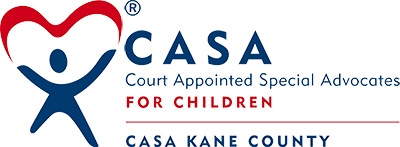CASA Kane County
Life of a Case in Abuse/Neglect Court
The typical process of an abuse or neglect case has its genesis in a hotline call and an ensuing
investigation by DCFS in the county where the report originated. If the investigator finds sufficient
basis, they may decide to remove the minor(s) from their home. Once minors are removed, the
case must be presented in court within 48 hours. The DCFS investigator contacts the State’s
Attorney’s Office with the information they have discovered, and the Assistant State’s Attorney
assigned to the abuse/neglect courtroom prepares a Petition for Adjudication alleging the facts as
presented and notifies the Court that a Shelter Care Hearing is necessary.
At the Shelter Care Hearing, attorneys (Public Defenders, Conflict Counsel) may be appointed to
represent parents. CASA Kane County is appointed as Guardian Ad Litem. Parent(s) or Legal
Guardian(s) who are present are served with the Petition for Adjudication. If parents(s) wish to
have a hearing, then testimony is taken from the investigator in order for the court to determine
whether probable cause and urgent and immediate exist to grant temporary custody and
guardianship. The Court grants DCFS temporary custody and guardianship typically. If the Court
did not find probable cause, the case would be dismissed, and the minors returned to the
parents/legal guardian. The Court may find that probable cause exists, but no urgent and
immediate necessity and the minors are returned to the parents/legal guardian if custody has not
already been taken.
Once CASA Kane County has been appointed, the Advocate Supervisors meet to discuss the facts
of the case and to select an available CASA/GAL volunteer who would be a good match for the
case based on strengths, professional and personal background and specific requests. For example,
a CASA/GAL’s background might be considered (i.e. nurse/medical issues; retired
teacher/education issues; female/sexually abused 14-year-old girl; male/10-year-old boy with
negative or no positive male role models; culturally matched advocates when possible). Once the
CASA/GAL volunteer agrees to accept the case they meet with the Advocate Supervisor to discuss
the case and plan the initial course of action.
The assigned CASA/GAL volunteer will meet the minor(s), foster parents, and parents, and
interview all relevant people to obtain a thorough picture of the situation and needs of the minor(s).
The CASA/GAL volunteer will enter notes in Optima for every visit and conversation, so that
documentation is available and consistent. The Advocate Supervisor will be in contact regularly
with the CASA/GAL volunteer to further strategize.
At the Shelter Care Hearing, the Court will set the date for the Adjudicatory Hearing (within 90
days of temporary custody). This hearing will determine whether the minor(s) are neglected and/or
abused or dependent. It is not a guilty finding for a perpetrator. At the Adjudicatory Hearing,
testimony is taken from the investigator and any other witnesses such as a police officer, medical
personnel, etc. If the court finds that the State has met its burden, the Court will make findings
towards the child and continue the matter for a Dispositional Hearing.
The Disposition Hearing must occur within 30 days of the Adjudication Hearing. DCFS or private
outside service agency caseworker assigned will present an Integrated Assessment, and Client
Service Plan to all parties and the Court, detailing all the services recommended to be completed
by the parents and services for the children. A goal is set which is typically return home within
twelve months. Parents are advised that full cooperation with agencies and recommended services
is required if they hope to achieve reunification. CASA Kane County presents its first court report
with recommendations at this hearing. The CASA/GAL volunteer writes the report based on
findings and submits it to the Advocate Supervisor for editing and approval within two weeks of
the scheduled court date. Advocate Supervisors distribute the report to all the parties of the case.
Once Disposition has occurred, the Court sets subsequent Permanency Review Hearings every six
months at which time the parents are found to have made reasonable efforts and progress, or not,
toward the Return Home Goal. Findings are also made as to reasonable efforts on the part of the
agency in providing the appropriate services in a timely fashion. CASA Kane County submits
reports for every hearing with recommendations. CASA Kane County may be the first to
recommend a goal change to substitute care pending determination of termination of parental
rights. This happens because an agency must first conduct an internal legal screening before they
are able to make such a recommendation to the Court. Other possible goals are Guardianship,
Independence for minors over fifteen, or Adoption if parental rights have already been terminated
or consents/surrenders have been executed by the parents.
During the six-month periods between Permanency Hearings, CASA/GAL volunteers are visiting
the minors, talking with foster parents, monitoring educational or medical needs, verifying parental
participation in services, and observing child/parent visits. Sometimes, there are problems with
communication between parties, which the Advocate Supervisors attempt to mediate and resolve.
Advocate Supervisors also receive various reports from service providers which are passed on to
the CASA/GAL volunteers. The CASA/GAL volunteers and Advocate Supervisors attend every
court hearing as well as, staffings that may be conducted on specific case issues including the six month Administrative Case Reviews held at DCFS.
Once a permanency goal has been achieved the case is closed. If all parties agree that parents have
satisfactorily completed their services, the Court returns legal custody and guardianship to the
parent(s) and closes the case, discharging CASA Kane County. Permanency may be achieved by
awarding guardianship to someone other than a parent (frequently a relative) or by a minor 21
years of age becoming emancipated.
When a case is formally closed by the Court and CASA Kane County is discharged, the advocate
returns the case file and all notes and documents to the CASA office. At that time, the CASA/GAL
volunteer is able to continue an informal relationship with the minor(s) if they mutually desire it.
Most often the relationship is severed since many families want to return to normalcy without
outside interference. However, some adoptive families continue to communicate with the
CASA/GAL volunteer and send pictures or Christmas cards. Additionally, some young adults stay
connected to the one support person that was there for them throughout the life of the case.
Click here to download a PDF of The Life of a case Abuse & Neglect

